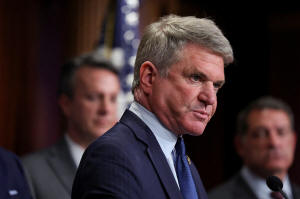US lawmakers raise worries about China in Microsoft deal with Emirati AI
firm
 Send a link to a friend
Send a link to a friend
 [July 12, 2024] By
Alexandra Alper and Christopher Bing [July 12, 2024] By
Alexandra Alper and Christopher Bing
WASHINGTON (Reuters) -Republican lawmakers asked the Biden
administration for an intelligence assessment of Microsoft's $1.5
billion investment in UAE-based artificial intelligence firm G42 over
concerns about transfer of sensitive technology and G42's historic ties
to China.
Representative Michael McCaul, chair of the House Foreign Affairs
Committee, and John Moolenaar, leader of the Select Committee on China,
made the request for a briefing in a letter dated Wednesday to White
House national security adviser Jake Sullivan, the committees said.
The Republicans said they want the briefing on the deal, announced in
April, before it advances to a second phase involving the transfer of
export-restricted semiconductor chips and model weights, sophisticated
data that improves an AI model's ability to emulate human reasoning.
The letter is a sign of growing concern about the lack of regulations
around the export of sensitive AI models, as fears mount that companies
like G42 might share the prized technology with U.S. adversaries like
China.
"We remain deeply concerned by attempts to move quickly to advance a
partnership that involves the unprecedented transfer of highly
sensitive, U.S.-origin technology, without congressional consultation or
clearly defined regulations in place," the lawmakers said in the letter.
They asked for a U.S. assessment of G42's ties to China's Communist
Party, military and government before the Microsoft deal advances. They
cited a recent visit by UAE President Sheikh Mohamed bin Zayed Al Nahyan
to Beijing to discuss, according to Chinese state news agency Xinhua,
cooperation in AI.

Microsoft said in a statement it was working closely with the U.S.
government and "U.S. national security will continue to be a principal
priority." The White House National Security Council spokesperson said
in a statement that the administration has been in regular dialogue with
lawmakers to ensure they are aware of the risks associated with digital
infrastructure. "National Security Advisor Jake Sullivan looks forward
to continuing this engagement, including with Chair McCaul," the person
added.
Spokespeople for G42 and the United Arab Emirates embassy did not
respond to requests for comment.
The Chinese Embassy said, "The U.S. has repeatedly undermined
cooperation between Chinese companies and other countries on trumped-up
security grounds."
[to top of second column] |

Foreign Affairs Committee Chairman Michael McCaul (R-TX) speaks
alongside House Republican impeachment managers and other Senate
Republicans during a press conference on the impeachment of U.S.
Secretary of Department of Homeland Security, Alejandro Mayorkas on
Capitol Hill in Washington, U.S., April 16, 2024. REUTERS/Amanda
Andrade-Rhoades/File photo

CONCERNS ABOUT CHINA
A House Select Committee aide told reporters on a phone call on
Thursday that based on conversations with Microsoft, the lawmakers
expect the U.S. company to export otherwise severely restricted AI
semiconductor chips to train models as well as AI model weights.
Microsoft President Brad Smith told Reuters in May that the deal
with G42 could eventually involve the transfer of sophisticated
chips and tools.
The Republicans' letter also cited G42's past "digital surveillance"
work as an area of possible risk. The aide highlighted prior
connections between G42 staff and Emirati cybersecurity firm
DarkMatter, which was the subject of a 2019 Reuters investigation on
its cyber espionage activities.
The U.S. has had deepening concerns about China's influence in the
Middle East and the United Arab Emirates, a longstanding U.S. ally.
But G42 said in February it divested its investments in China and
was accepting constraints imposed on it by the United States to work
with U.S. companies. G42 previously had investments or partnerships
in China with TikTok owner ByteDance, vaccine developer Sinopharm
and U.S.-blacklisted biotech firm BGO Genomics.
The New York Times reported in April that the Microsoft deal with
G42 was largely orchestrated by the Biden administration to box out
China. Commerce Secretary Gina Raimondo told the paper that the
Microsoft deal did not authorize the transfer to G42 of AI models or
processors to develop AI applications.
Along with Microsoft, Abu Dhabi sovereign wealth fund Mubadala, the
country's ruling family and U.S. private equity firm Silver Lake
hold stakes in G42, whose chairman, Sheikh Tahnoon bin Zayed Al
Nahyan, is the UAE national security adviser and a brother to the
president.
Reuters reported in May that the Commerce Department was considering
rules to restrict the export of proprietary or closed-source AI.
Currently, nothing is stopping U.S. AI giants from selling them to
almost anyone in the world without government oversight.
(Reporting by Alexandra Alper and Christopher Bing; Editing by Lisa
Shumaker, David Gregorio and Cynthia Osterman)
[© 2024 Thomson Reuters. All rights
reserved.]
This material may not be published,
broadcast, rewritten or redistributed.
Thompson Reuters is solely responsible for this content. |